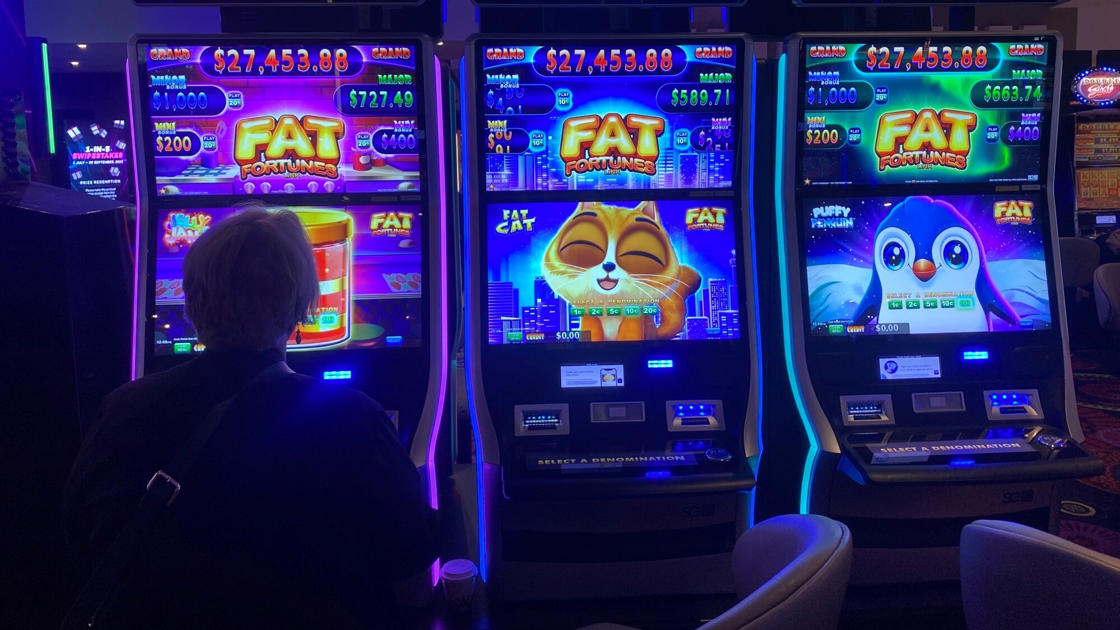
A reformed gambler from Ballarat says a poker machine addiction nearly pushed her to the brink and that urgent action is needed to protect others from harm.
Her warning comes as new data reveals that regional areas are being hit hardest by the addictive machines.
Benalla residents lost more to poker machines per capita than any other area in the state in the last financial year, at more than $1,000.
This was followed by Central Goldfields Shire, where losses equating to $839 per person were recorded in the same time period, according to a Monash University analysis.
Ballarat grandmother Lynda Genser told ABC’s Statewide Drive introducing limits on pokies venue opening hours could have an immediate effect in reducing harm.
She beat her crippling addiction 16 years ago, but remembers a time when she would go straight to a venue after work and sit at the machines until they closed at 4am or 5am.
Then she would go home to shower and then return as soon as the venue reopened and play until was time to go to work.
“In my worst year I lost over $100,000,” Ms Genser said.
“I had been having troubles going to the pokies too often but when my husband and I separated, that was it.
“I went totally around the bend.”
Experts say pokies machines are designed to hook vulnerable people in.
Ms Genser says restrictions on operating hours could have an immediate impact in reducing harm.
“It is just like narcotics, cigarettes and alcohol — you get to like the feeling,” Ms Genser said.
“It is like having a frontal lobotomy, a brain operation — you sit there and all you do is hear the music and the lights and you change from game to game.
“You usually start off with a few little wins.
“After that it is not a joke anymore.”
In the end, it was an ultimatum from her adult child that helped Ms Genser beat her 15-year addiction.
“I was given a choice between living with my offspring and their son when he was born or not seeing him ever,” she said.
“The grandson I live with is going to be 16 in the middle of October.”
‘Australia’s blind spot’
More than $11.4 billion was lost on poker machines in the last financial year in Australia, despite lockdown periods, data shows.
The Victorian figure equates to about $2,800 in losses for every Victorian.
Monash University gambling researcher associate professor Charles Livingstone said poker machines exploited Victoria’s most vulnerable and disadvantaged residents.
He said increased regulation should be a priority, including a universal pre-commitment system allowing people to decide what to spend in advance.
The system is being rolled out at Crown Casino, but Dr Livingstone said it was unfair and unreasonable that gamblers at other venues did not have this protection.
He also called for limits to pokie venue opening hours and introducing a $1 maximum bet, with a limit on $20 in a machine at any one time.
The current regulation allows a $5 maximum bet and $1,000 to go into a machine at any one time.
Alliance for Gambling Reform chief advocate Tim Costello said Australia had the most pokies in pubs and clubs or anywhere in the world.
“Australia has 75 per cent of the world’s pokies in pubs and clubs,” he told Statewide Drive.
“They are utterly accessible.
“Most pokies in the rest of the world are in casinos and that is destination gambling.”
Mr Costello said the government was failing to protect vulnerable people.
“It really is Australia’s blind spot,” he said.
“If America’s blind spot is guns, this is Australia’s.”
A state government spokesperson said the Victorian Gambling and Casino Control Commission was established to provide stronger regulation and oversight.
“Gambling harm minimisation is a central part and focus of the VGCCC’s core business and it is legally required to consider this in every single decision that it makes,” they said.
The spokesperson said reforms had been introduced, including limiting EFTPOS cash withdrawals to $500 per card over 24 hours and capping the number of gaming machines at the current level until 2024.
A new code of conduct has been introduced to strengthen the obligations of venue operators to better respond to suspected problem gambling.